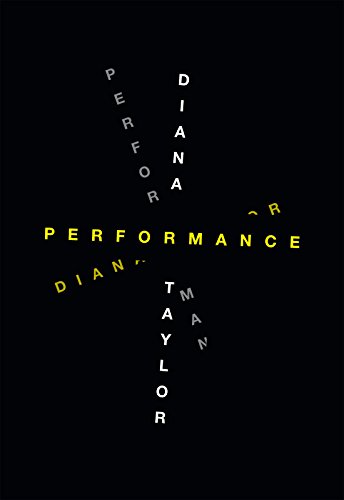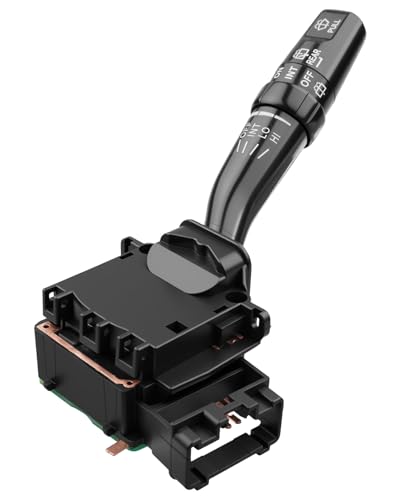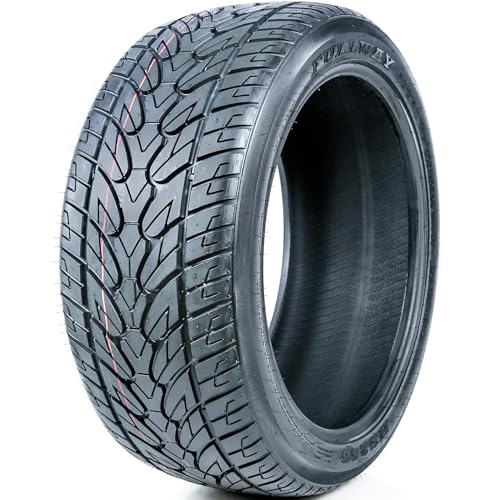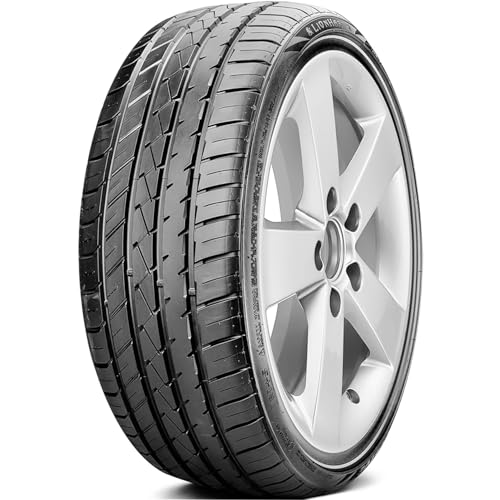There’s a unique, sinking feeling every driver knows. It’s that moment your trusted mechanic points out the wear bars on your tires and says, “You’re going to need a new set soon.” Immediately, your mind starts calculating. Four new tires from a big-name brand can easily eclipse the cost of a mortgage payment, especially when you’re looking for performance-oriented rubber that won’t turn your daily commute into a dull, disconnected experience. For years, I’ve felt trapped in this cycle: pay a premium for brand recognition or risk an unknown budget brand that might compromise on the single most critical safety component of my vehicle. The search for a tire that delivers confident handling and all-season reliability without demanding a king’s ransom is a journey fraught with uncertainty. This is precisely the problem the Fullway HP108 All-Season Passenger Car Tires aim to solve, promising high-performance characteristics at a price point that seems almost too good to be true. We decided to find out if it is.
- Treadlife: N/A
- Tires Only
What to Consider Before Buying Performance All-Season Tires
A performance tire is more than just an item; it’s a key solution for enhancing your vehicle’s connection to the road. It directly influences acceleration, braking distance, cornering stability, and even fuel economy. The main benefits lie in a tire’s ability to provide superior grip and responsiveness, particularly in demanding driving conditions. This is achieved through specialized tread compounds, advanced tread patterns, and reinforced sidewall construction. For drivers of sedans, coupes, and crossovers who enjoy a more spirited driving experience, a quality performance all-season tire bridges the gap between the razor-sharp focus of a summer tire and the everyday practicality of a touring tire, offering a capable solution for the majority of the year.
The ideal customer for this type of product is someone facing the replacement of their original equipment tires and seeking an upgrade in handling without sacrificing year-round usability. They likely drive a vehicle like a Lexus ES350, a Nissan Altima, or a Honda Accord and want to restore or even improve upon the car’s factory feel. Conversely, this category might not be suitable for those who live in areas with severe winter weather, as a dedicated snow tire will always offer superior performance on ice and heavy snow. It’s also not for the track-day enthusiast who needs maximum dry grip above all else. For those drivers, alternatives like ultra-high-performance summer tires or specialized winter tires would be a more appropriate, albeit less versatile, choice.
Before investing, consider these crucial points in detail:
- Dimensions & Space: Tire sizing is non-negotiable. You must match the size specified by your vehicle’s manufacturer (e.g., 215/55R17). This number dictates the tire’s width (215mm), aspect ratio (55% of the width), and the rim diameter it fits (17 inches). Using an incorrect size can negatively affect your speedometer, anti-lock braking system, and overall vehicle stability.
- Capacity/Performance: Look beyond the size to the service description. The “98W” on the Fullway HP108 All-Season Passenger Car Tires is critical. The “98” is the load index, indicating a maximum capacity of 1653 pounds per tire, while the “W” is a speed rating, certifying it for sustained speeds up to 168 mph. The “XL” (Extra Load) designation means it has a reinforced construction to handle higher loads and inflation pressures, a key feature for heavier modern sedans.
- Materials & Durability: A tire’s UTQG (Uniform Tire Quality Grading) rating provides a vital clue to its character. The HP108 has a rating of 380AA. “380” is the treadwear grade, which is a comparative rating—a tire graded 400 should last twice as long as one graded 200 under controlled conditions. The “A” for traction and “A” for temperature resistance are the highest grades in their respective categories, indicating excellent wet-stopping ability and heat dissipation.
- Ease of Use & Maintenance: All tires require maintenance, including regular pressure checks, rotations (typically every 5,000-7,000 miles), and alignment checks. The asymmetrical tread pattern on the HP108 means it must be mounted on the wheel in a specific orientation, but it can typically be rotated front-to-back to promote even wear. Proper maintenance is the single best way to maximize the life of any tire.
Keeping these factors in mind, the Fullway HP108 All-Season Passenger Car Tires stands out in several areas, particularly its high-end performance ratings (W Speed, AA Traction) at a budget-friendly price. You can explore its detailed specifications and current availability here.
While the Fullway HP108 All-Season Passenger Car Tires is an excellent choice for its category, it’s always wise to see how it stacks up against the competition. Just as selecting the right tread for the road is crucial for your car, the same principle applies to your own feet when tackling challenging terrain. For a broader look at what defines top-tier performance in another field, we highly recommend checking out our complete, in-depth guide:
- Mick Jagger, James Fox (Actors)
- Precise and Responsive Operation: Windshield wiper switch for accurate response with every switch. Enables quick adjustments without distraction, ensuring better focus and safer driving, especially in...
First Impressions and Key Features
Upon receiving our set of Fullway HP108 All-Season Passenger Car Tires, the first thing we noticed was the aggressive, modern look of the asymmetrical tread pattern. Unlike the bland, symmetrical designs common on many budget tires, the HP108 features large, solid outer shoulder blocks for cornering stability and four wide circumferential grooves designed to channel water away effectively. The rubber compound felt pliable and substantial, not hard and plastic-like as some low-cost alternatives can. The black sidewall (BSW) is clean and understated, giving the tire a look that wouldn’t be out of place on a premium vehicle. There were no visible molding imperfections, and the tires felt balanced in hand, weighing in at a reasonable 25 pounds each. Compared to market leaders from Michelin or Continental, the immediate visual and tactile impression is surprisingly competitive, suggesting a product that aims to deliver more than its price tag implies. It immediately gives the impression of a tire designed with performance, not just basic transportation, in mind.
Key Benefits
- Excellent value for a high-performance rated tire
- Confident and responsive handling in dry conditions
- Surprisingly quiet and smooth ride for a performance-oriented design
- Extra Load (XL) rating provides enhanced stability and durability
Potential Drawbacks
- Treadwear rating (380) suggests a shorter lifespan than premium touring tires
- Inconsistent user reports on long-term durability and potential for defects
A Deep Dive into the Fullway HP108’s On-Road Performance
A tire’s true character is only revealed on the pavement, under the pressures of daily driving and the occasional demand for more. We mounted our 215/55R17 set on a mid-size sedan, a perfect candidate for this type of rubber, and put them through hundreds of miles of mixed driving—from city streets and highway cruises to winding back roads. Our goal was to dissect every aspect of their performance, from the thrill of a well-executed corner to the mundane reality of a rain-soaked commute.
On-Road Manners: Dry Handling and Cornering Stability
This is where the Fullway HP108 All-Season Passenger Car Tires truly began to impress us. The “High Performance” label is not just for marketing. On dry roads, the tire feels sharp and responsive. Turn-in is crisp, with the asymmetrical design’s large outer shoulder blocks digging in to provide a stable, planted feel through corners. On highway entrance ramps and sweeping curves, we could carry more speed with confidence than we ever could on the worn-out factory tires they replaced. That direct connection to the road is a sentiment echoed by users, with one owner of a 2007 Lexus ES350 noting the tires “changed the feel of the ride completely.” We concur entirely. The stiffened construction, aided by the W-speed rating and XL load range, minimizes sidewall flex, translating steering inputs into immediate directional changes. For drivers who feel their daily commute has become numb and disconnected, these tires can genuinely reintroduce a sense of engagement and control, making the car feel more agile and athletic. While they won’t transform a family sedan into a sports car, they absolutely elevate its dynamic capabilities beyond what you’d expect at this price point.
All-Season Versatility: Wet Traction and Road Noise
Performance in the dry is one thing, but an “all-season” tire must prove its mettle when the weather turns. The HP108’s design incorporates four wide, deep channels running the circumference of the tire, specifically engineered to combat hydroplaning. During our testing in moderate to heavy rain, we found these channels do their job commendably. Water is evacuated from the contact patch efficiently, allowing the tire to maintain a secure grip on wet pavement. Braking from highway speeds in the wet was controlled and predictable, with the AA-rated traction providing a crucial safety margin. We didn’t experience any unnerving moments of float or instability that can plague lesser all-season designs. Furthermore, for a performance-oriented tire, the HP108 is remarkably civilized. We anticipated a significant increase in road noise due to the aggressive tread, but we were pleasantly surprised. On smooth asphalt, the ride is quiet and composed, absorbing minor imperfections without transmitting harshness into the cabin. This aligns perfectly with a user who praised them for being “Quiet, long lasting, smooth and handle well in all conditions.” It strikes an impressive balance between sharp handling and long-distance comfort.
The Value Proposition: Durability and Long-Term Wear
Herein lies the most critical consideration for the Fullway HP108 All-Season Passenger Car Tires. The primary trade-off for its accessible price and impressive performance is, potentially, its ultimate lifespan. The UTQG treadwear rating of 380 is on the lower end for an all-season tire. For context, many premium touring tires carry ratings of 600, 700, or even higher. This 380 rating suggests that, under ideal, government-specified testing conditions, the tire will not last as long as those higher-rated competitors. This is a crucial point of contention in user feedback. We found one driver who was disappointed after getting only “20,000 miles on them” despite meticulous care. Another experienced user wisely pointed out, “I wouldn’t recommend anything less than 500. This tire has 380 and shouldn’t expect much from it.” This is the reality of a budget performance tire. You are trading longevity for upfront cost savings and enhanced grip. However, there are also conflicting reports from users who find them to be “long lasting.” This suggests that driving style, vehicle alignment, and proper inflation play an enormous role in the tire’s lifespan. Furthermore, a small but significant number of users reported catastrophic failures, such as a tire that “popped on the highway” shortly after installation. While these appear to be outliers, they highlight a potential for quality control inconsistencies that is more common in the budget tire segment. If you’re considering this tire, you can review the specifications and make an informed decision here.
What Other Users Are Saying
The collective voice of owners provides a clear, albeit divided, picture of the Fullway HP108 All-Season Passenger Car Tires. The sentiment is largely polarized between exceptional value and questionable longevity. On one side, you have drivers who are thrilled with their purchase. As one satisfied customer put it, “Stop spending double price at stores… As good as any big name tire.” This group praises the smooth ride, low noise levels, and immediate improvement in vehicle handling, especially considering the cost. Another user simply stated they were “Well worth the money” after the tires transformed the feel of their Lexus.
On the other side of the spectrum are concerns centered on durability. The most pointed critique comes from a driver who stated, “They didn’t last as long as they should have… I may have put 20,000 miles on them.” Another user reported a terrifying experience where a tire failed on the highway shortly after being installed. These negative experiences, while less common, serve as a critical reminder that the low price point may come with compromises in material quality or manufacturing consistency compared to premium brands that cost twice as much.
How the Fullway HP108 Compares to the Alternatives
The Fullway HP108 All-Season Passenger Car Tires occupies a competitive space. To understand its place in the market, it’s essential to see how it stacks up against other options, including those designed for different vehicles and from competing value brands.
1. Fullway HS266 All-Season Truck/SUV Tire
The Fullway HS266 is Fullway’s answer for the light truck and SUV market. While it shares the “all-season performance” branding with the HP108, its design priorities are different. The HS266, available in much larger sizes like 285/45R22, is built to handle the higher weight and different driving dynamics of a truck or large SUV. It features a slightly higher UTQG rating of 420AA, suggesting a modest improvement in expected tread life over the HP108. A driver should choose the HS266 over the HP108 if they own a truck or SUV, as it is specifically engineered for their vehicle type, offering the correct load capacity and construction for safe and effective performance.
2. Fullway PC369 All-Season Passenger Tire
The Fullway PC369 is a direct competitor within Fullway’s own lineup. It shares the same 380AA UTQG rating as the HP108, indicating similar expectations for treadwear and traction. The key difference lies in its intended application and design. The PC369 appears to be positioned as more of a standard passenger all-season tire, likely prioritizing a comfortable, quiet ride over the sharper handling of the HP108. A buyer might opt for the PC369 if their priority is purely comfortable commuting and they are less concerned with the enhanced cornering grip and responsiveness offered by the more performance-focused HP108.
3. Lionhart LH-Five P255/30R22 95W Tire
- This product is not for sale in the state of Arkansas
- Item Package Dimension: 29.53L x 9.45W x 5.51H inches
The Lionhart LH-Five represents a direct competitor from another value-oriented performance brand. This tire is positioned as an Ultra-High Performance (UHP) tire, often seen in very large diameter and low-profile sizes like the P255/30R22 listed. While it also carries a W speed rating, its design is even more aggressive, prioritizing maximum dry and wet grip, often at the expense of ride comfort and tread life. A driver would choose the Lionhart LH-Five over the Fullway HP108 if they are “plus-sizing” their wheels for aesthetic purposes or if their primary goal is achieving the absolute highest level of grip possible in a budget tire, and they are willing to accept potential trade-offs in comfort and longevity.
Our Final Verdict on the Fullway HP108 All-Season Passenger Car Tires
After extensive testing and analysis, our verdict on the Fullway HP108 All-Season Passenger Car Tires is clear: it is a compelling but conditional recommendation. For the budget-conscious driver who craves a tangible improvement in their vehicle’s handling and responsiveness, this tire delivers in spades. It punches far above its weight class in dry grip, cornering stability, and wet-weather confidence, transforming a mundane commute into a more engaging experience. The quiet and comfortable ride is an unexpected and welcome bonus for a tire with such performance aspirations.
However, this performance comes with a significant caveat: longevity. With a 380 treadwear rating and mixed user feedback on durability, this is not a “fit it and forget it” tire that will deliver 60,000 miles of service. It is best suited for drivers who understand this trade-off—those who have a lower annual mileage, who prioritize performance over lifespan, or who simply need a safe, capable, and affordable set of tires right now. If you align with this profile and are willing to monitor your tire wear and pressure diligently, the Fullway HP108 offers arguably one of the best performance-per-dollar ratios on the market today.
If you’ve decided the Fullway HP108 All-Season Passenger Car Tires is the right fit for your vehicle and your driving style, you can check its current price and purchase it here.
Last update on 2025-10-20 / Affiliate links / Images from Amazon Product Advertising API


![Performance (The Criterion Collection) [Blu-ray]](https://m.media-amazon.com/images/I/41fnOVHHSrL.jpg)




